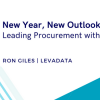AI is instrumental when analyzing multiple, complex data assets to identify insights that are critical to predicting outcomes.
There is no shortage of analysis and predictions today regarding COVID-19 and our future. While experts of all walks of life weigh in via global news channels, healthcare organizations are still left addressing the here and now as well as surges that could happen tomorrow, next week or in a few months. For those supporting the front lines securing necessary supplies and resources, it is paramount to be able to deliver what is urgently needed. Unfortunately, sourcing departments are burdened with a heavy task navigating the unknown of the coronavirus, driving the need for some concrete insights to help guide them.
In the midst of crisis and chaos, data and analytics can serve as that compass. There is no doubt that data modeling has enjoyed a high profile during this pandemic. It’s a part of our daily life as figures dominate the news. Non-specialists and experts alike dissect and discuss the latest stats over coffee and Zoom calls. In my role, I am also surrounded by data. I have a keen interest in understanding how different combinations of data sets can be used to prevent and predict further COVID-19 outbreaks.
Data at Work During the Pandemic
That’s why I was very pleased to leverage data and contribute to the country’s reopening efforts. Our team at Experian, which included our DataLabs, launched a free, interactive heat map of geographic populations at-risk of being most susceptible to developing severe cases of COVID-19. Called the Experian COVID-19 Outlook and Response Evaluator (CORE) tool, it is intended to guide healthcare organizations and government agencies as they plan for the “new normal” and coronavirus recovery.
The map pulls in de-identified data by region (to the county level) – such as pre-existing conditions and social determinants of health – to form a comprehensive picture that models possible pandemic impact on medical providers and community resources. As organizations navigate many unknowns moving forward, the Experian CORE heat map offers a real-time tool to inform those efforts.
The map takes into account three primary data streams, including disease spread as represented by the number of cases and the number of deaths, co-morbidity rates and social determinants and their effect on COVID-19 spread. The developers of the tool also considered demographics, such as which age groups were the most vulnerable. What resulted was a blend of all three data models into a master model for over 3,000 counties.
Additionally, we creatively used unstructured data such as maps and photos to deduce information like housing density through aerial maps. Risk scores are assigned at the county-level and segmented by the three risk factors. For example, one unique data set analyzes risk by the average number of stores visited by consumers in the region.
>> Post-Pandemic Update: Category Outlook & Market Intelligence 2020. <<
Data and Artificial Intelligence
Today, you can’t talk about data and analytics without talking about artificial intelligence, and this project is an example of how impactful it is. AI is instrumental when analyzing multiple, complex data assets to identify insights that are critical to predicting outcomes. The spread of COVID-19 and its movement through different regions and populations has been anything but predictable, which translates into data with many peaks and valleys and seemingly no patterns. It is only through the use of powerful AI tools that this data can be harnessed to tell a story.
In our heat map, AI is being used to help us identify the communities most at risk. It also helps the supply chain by shining a light on these same areas that are most likely in need of more ventilators, personal protection equipment or other healthcare supplies. The good news is the amount of virus-related data we are getting and from companies that want to help continues to grow, and the additional insights should equate to better and better results.
Decision-Making that is Data-Driven
We’re in a time where AI can rapidly sort through a tremendous amount of data, pick up those insights that can most influence getting the predictions and outcomes right, and learn as the data shifts and moves in new directions. Over the last few years, AI has made creating such dynamic, complex models much easier.
More than 5,000 organizations have accessed the CORE tool to date. As healthcare and government leaders focus on managing surges across the country, we hope it continues to benefit those who are looking for data that will contribute to making informed decisions around resource allocation and planning, as well as future strategies on how to re-open and operate schools, businesses and communities. This is especially necessary for those in procurement and the supply chain, where predictive modeling can provide much-needed guidance on where and when resources may be needed, and how to plan to optimize the distribution of those resources.
>>Get the COVID-19 Resource Toolkit for Sourcing, Procurement and Workforce Management<<
Many organizations are seeing firsthand how data can help protect people’s physical health. Those organizations are now starting to ask questions about how data can be used for other purposes, such as supporting people’s emerging needs – like mental health – which is an exciting prospect. There’s no limit to how data can help organizations and industries if we harness it in the right ways.







